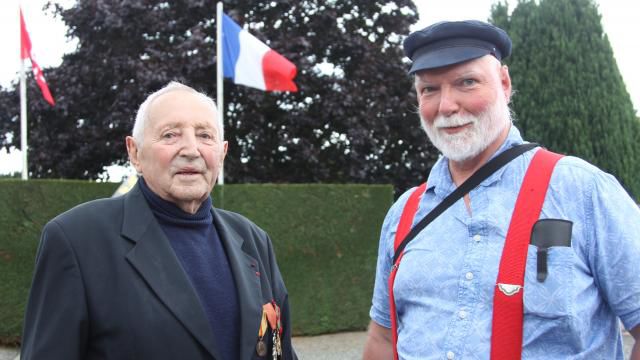WWII interests lead professor of French to new passion: documentary making
April 10, 2019
French professor Richard Berrong’s film career began modestly. After learning how to tape lectures and edit them in order to keep things interesting for his students online, he decided to combine his newly found skill with his lifelong interest in World War II history.
While visiting a home in Paimpol, France, that he’d been going to for about 20 years, Berrong began asking friends who lived through World War II if they’d be interested in answering some questions on tape about their time under German rule.
“I bought a camcorder and said to my friends, ‘Would you let me video you while I ask you questions about your memories of the war?’” Berrong said. “That was about five years ago. I came back at the end of one summer and I had maybe 15 interviews that I filmed.”
Berrong was inspired by filmmaker Ken Burns’ documentaries on war to turn his many interviews into a documentary of his own. His first film, “C’était la joie!” meaning “Everyone Was Happy!” in English, is about the weeks it took American soldiers to liberate France in 1944.
After creating and editing the movie on his own without any prior film education or experience, Berrong took his documentary to Paimpol’s local cinema, Cinébreiz.
“I went to the president of the theater and I said, ‘What would it cost to rent the theater for one afternoon to show this movie to the people I’ve interviewed?’ He said, ‘Well I’m going to watch it.’ And he did. After he said, ‘We’re not going to rent the theater to you. We’re going to show it as a movie to the public.’”
The film was released in Paimpol on August 17, 2017, the 73rd anniversary of France’s liberation from Germany.
Before the premiere, Berrong was warned by the president of the cinema to not expect more than 40 seats to be filled. However, to Berrong and the president’s surprise, not only did they have to turn people away the night of the premiere, but they had to schedule a second showing the next to day because there were so many people in attendance.
After his first film debuted, Berrong used extra footage from interviews done while making the first film to create a second. His second film, “On Avait Plutôt Peur,” meaning “We Were Scared,” was centered around accounts made by residents of Paimpol about what it was like to live under Germany’s rule during World War II and released over the summer of 2018.
“I said to myself, ‘I can’t throw this away. This stuff is too interesting,’” he said. “So I worked on it, and I got a second movie on part of that topic. It opened last summer. Same thing — packed house. I am now, I just totaled it up, I think I’ve interviewed something like 98 people who lived through the war there.”
After the release and success of his first two films, Berrong gained notability in France. Not only has the French press written about him numerous times, but the citizens of France have also become fans of his work. With all of this attention, Berrong feels a responsibility to tell France’s story. Berrong first felt this responsibility weigh heavily on him during the 73rd commemoration of the liberation of France, where his first film was shown.
“The mayor is giving his speech (at the commemoration), he starts to talk about my movie and he points to me and says, ‘If you have memories of the occupation in World War II, you need to tell Richard, because that’s how we’re going to transmit them to the future.’ It’s a lot. … It’s a sense of responsibility.”
Each time Berrong visits Paimpol, which is as much as possible, he’s often approached to conduct interviews with French residents who were alive during World War II. So much that he’s made a third film and even has plans for a fourth.
“The third movie is about daily life during the occupation,” he said. “What was it like to go to school? What did you do to find something to eat?”
While it started as only a hobby, filmmaking has quickly become a passion of Berrong’s. A passion that he hopes to not only continue as a professor, but take with him well into his retirement.
“What I love is talking to people about the memories of important things and finding a way to put it together,” he said. “I would like to keep this going. … As I said, I’m 67 years old, I’m not going to teach forever. Retirement is approaching, and this to me would be a spectacular way of keeping busy in retirement.”
Abigail Miller is a feature writer. Contact her at [email protected].












